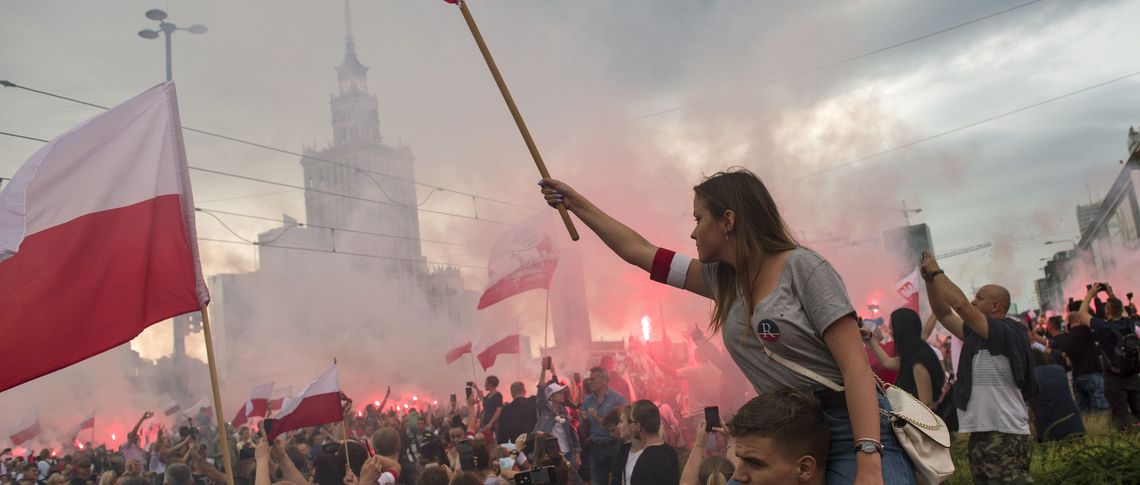Over the past decade or so the euphoria associated with the collapse of communism has turned to pessimism, as many once-promising democracies in eastern Europe have slid into illiberalism and even authoritarianism. Understanding why this happened is crucial not only for scholars of the region but supporters of democracy worldwide.
Since east-European countries are wealthier today than in 1989, with citizens having access to products and conveniences they could only have dreamt of under communism, economic grievances are often dismissed as potential causes of support for right-wing populists and the democratic backsliding set in motion by them. But such reasoning rests on a simplistic understanding of the transition to, and the social and political consequences of, neoliberal capitalism. Although eastern Europe is of course distinctive in many ways, research by scholars from the region about these consequences has lessons for those trying to understand the role played by neoliberal capitalism in causing democracy’s problems in other parts of the world today.
The Great Depression of eastern Europe
A new book by Kristen Ghodsee and Mitchell Orenstein, Taking Stock of Shock, provides an excellent jumping-off point. Based on their own work and that of other east-European scholars, Ghodsee and Orenstein make clear how misleading assessments based on simple, aggregate measures of economic growth, gross domestic product and so on can be. They show that while east-European countries are indeed wealthier today than in 1989, getting there entailed immense economic suffering and social dislocation: the transition to capitalism generated ‘the largest and most enduring economic collapse to affect any world region in modern history’.
In the more successful central-European countries this collapse was comparable to that experienced by the United States during the Great Depression. In other post-communist countries, it was worse and lasted longer - in some cases for decades. During this period, on average, poverty increased by 23 per cent and ‘in ten countries, including Poland, poverty rates increased by 49 per cent or more before starting to decline’. Ghodsee and Orenstein found that ‘at peak misery in 1999, 45 per cent of all the people in post-communist countries … lived below the absolute poverty line of $5.50/day’.
The transition to capitalism generated ‘the largest and most enduring economic collapse to affect any world region in modern history’.
Taking Stock of Shock not only details the suffering experienced by post-communist societies, on their way to becoming the relatively prosperous economies of today, but also makes clear that this was not equally shared. Income and wealth inequality exploded and deep divisions - between urban and rural areas, educated elites and workers, old and young - developed as a result of the transition.
An unequal burden
This was particularly dislocating, since before 1989 eastern Europe had been among the most equal regions of the world. Moreover, as Ghodsee and Orenstein note, ‘it is one thing to be thrust into deep poverty for the first time in your life. It is quite another thing to be thrust into poverty when some of the people around you are enjoying previously inconceivable levels of personal wealth.’ This they say left ‘deep scars’ on ‘the collective psyche’.
Moreover, it is not just the traumatic economic consequences of the transition to capitalism that a focus on the relatively high contemporary GDP enjoyed by east-European countries today misses. As Taking Stock of Shock makes clear, the social dislocation has been immense. Perhaps the most obvious manifestation is a demographic crisis of historic proportions. After 1989 emigration from eastern Europe was ‘unprecedented in speed, scale and persistence compared with emigration experiences elsewhere’.
This was accompanied by a collapse in fertility and a surge in mortality. Homicide (and crime more generally) shot up, along with binge-drinking, heart disease, suicide and other ‘deaths of despair’, particularly among middle-aged men living outside big cities. Cumulatively, many east-European countries experienced population declines akin to, or even greater than, those experienced by countries involved in major wars.
‘At peak misery in 1999, 45 per cent of all the people in post-communist countries … lived below the absolute poverty line of $5.50/day’.
Even though GDP recovered in the US and European countries after the Great Depression, all scholars of the period accept that the associated economic suffering had immense political consequences. In some countries, of course, it triggered the collapse of democracy. That similar if not greater economic suffering, along with the profoundly disruptive social changes experienced by east-European populations since 1989 would not have political consequences is unimaginable.
How economic hardship becomes political
Yet why have nationalist populists so often been the ‘beneficiaries’ of eastern Europe’s traumatic experiences? As Ghodsee and Orenstein note, since it was the ‘losers’ of the transition, sometimes referred to in the region as ‘thrown-away people ' - older, working-class, less-educated and/or rural citizens - who disproportionately supported nationalist populists, explaining their political behaviour is crucial.
That these voters became the base of nationalist populist parties in the region was not, as myriad scholars including David Ost, Maria Snegovaya, Anna Grzymala-Busse, Milada Vachudova, and Gabor Schering have shown, because they were inherently prone to vote for illiberal, xenophobic politicians. Rather it was because nationalist populists, rather than left parties, proved most responsive to their economic grievances.
In the years after the transition, most parties of the left in eastern Europe became ardent champions of neoliberalism - even more so than many of their counterparts on the right - and in government implemented painful neoliberal reforms. This allowed them to separate themselves from the communist past, while neoliberal capitalism was presented as the necessary path to economic modernisation by the east-European left parties’ west-European counterparts - reforms also of course advocated by the European Union.
The outcome was that left parties became associated with neoliberalism and the economic suffering and social dislocation generated by it. On top of this, they often refused to present themselves as champions of workers and other groups that lost out in the transition. Indeed, many left as well as liberal parties saw concessions to the ‘losers’ as a potential threat to the political and economic liberalism they so desperately wanted their societies to realise.
Left parties became associated with neoliberalism and the economic suffering and social dislocation generated by it.
The irony, of course, is that by inextricably linking economic and political liberalism, and not responding to the suffering and dislocation caused by the former, many left (and liberal) parties created opportunities for nationalist populists who cared little for the latter. Scholars, including those mentioned above, have shown how nationalist populists purposefully solicited those who felt they had lost out - directing their anger at ‘foreigners’, European ‘bureaucrats’ and ‘crypto-communists’ - and implemented at least some policies which addressed their economic grievances. More clearly than in western Europe, scholars have been able to trace the electoral path of many of neoliberal capitalism’s ‘losers’ from left, liberal and other parties into the arms of nationalist populists.
Although facile comparisons should be avoided, it is hard not to see some obvious potential lessons from eastern Europe. At the very least, research on the transition there should remind us that aggregate measures of growth and development can hide immense economic suffering and that the social costs of neoliberal capitalism can be even greater than its economic ones. In addition, the political consequences of neoliberal capitalism are often indirect and complex: while there is little correlation between wealth and the success of nationalist populist parties, it would be wrong to dismiss the causal impact of economic grievances.
That these had anti-democratic political consequences was not inevitable: it depended on how various political actors reacted to them. That left (and liberal) parties were often unwilling or unable to offer responses to these grievances, within the framework of liberal democracy, created an opportunity for others - not committed to that framework - to do so.
This article is a joint publication by Social Europe and IPS-Journal.






